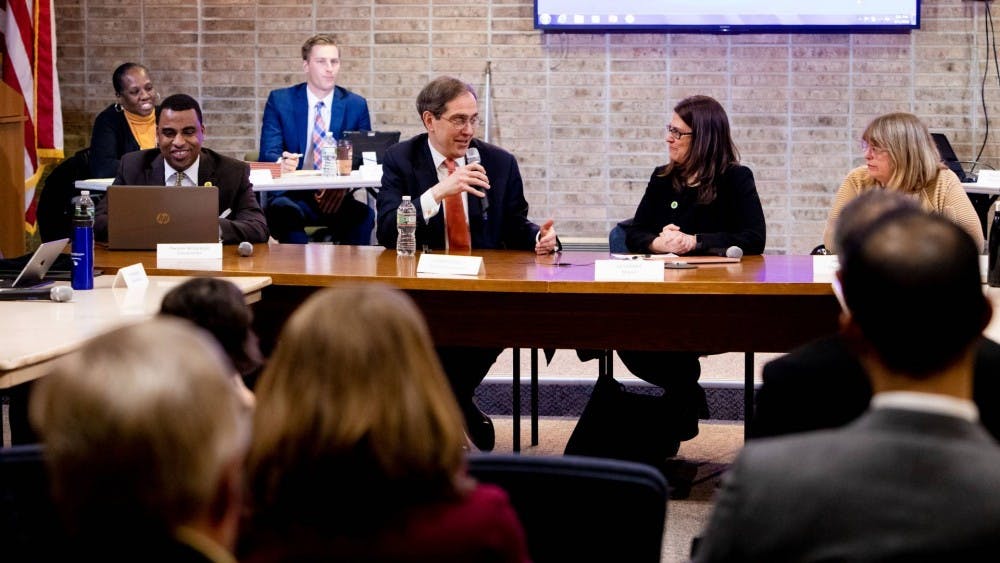The Office of Communications published its annual summary detailing the University’s contributions to the surrounding town of Princeton on Feb. 12.
Ranging from voluntary contributions to the municipality of Princeton and working with emergency services to educational outreach at Princeton High School and supplying transportation, the report brings attention to the University’s primary investments in the community.
Through routine meetings with University administration, the town community maintains an open line of communication, said Mayor Liz Lempert.
“We have done a lot of work with individual professors and groups of students to promote collaboration at the council level,” she said.
On Monday, Feb. 11, President Christopher Eisgruber ’83 met with Lempert and other city officials “to discuss a range of mutual interests” regarding the University’s sustainability plan, transportation management, and community partnerships, according to the Office of Communications.
“[The University’s strategy] is about facilitating various kinds of startups or joint ventures, and trying to make sure that we have the nimbleness to accommodate different potential research collaborators as they come in,” Eisgruber said at the meeting.
One of the hallmarks of the relationship between the University and the town community is the multi-year agreement signed between the city council and University officials.
According to the Office of Communications, the most recent agreement from 2014 lasts seven years, outlining a $22 million contribution over to the town for an array of services and projects.

The most prominent services involve personnel support between Public Safety and the Princeton Police Department, according to Sergeant Fred Williams.
“In monthly meetings, we see how we can do things better … constantly working to make the relationship as balanced as it can be,” he said.
One example Williams referenced was that PSAFE and the PPD share their responses to calls.
In addition, Sergeant Williams recommended that the University continue to support the essay and sporting competitions it co-hosted with the police department. According to Williams, those competitions built trust between the police and the community.

Students also have an active role in the University’s partnership with the community. University students are a part of, or run, tutoring services and volunteer programs such as the Princeton First Aid and Rescue Squad (PFARS).
Tim Sadov ’22, who is actively involved in tutoring math and history to Princeton’s middle-school students with Academic Success Today (AST), wrote in an email to The Daily Princetonian that the University could better advertise opportunities such as AST.
“Many of my friends are unaware that these programs exist,” he wrote in the email.
Sadov added that the local community could always benefit from more tutors from schools like Princeton.
However, the agreement is set to expire within the next two years. When asked about future contributions on behalf of the University, Mayor Lempert told the ‘Prince’ that she hoped for additional agreements.
“They create stability and allow both parties to make projections into the future of the Princeton campus and community,” she said.
While impressed with the nature of the city’s relationship with the University, Councilwoman Leticia Fraga stated that she would like the University to contribute even more to local businesses and vendors in the Monday meeting with Eisgruber.
Agreements between the University and the town foster the cooperative climate needed for the University to pursue its own projects, especially considering the University’s solidifying plans to expand its borders through the establishment of new residential spaces for undergraduate and graduate students, according to the Mayor’s office.
The establishment of Perelman College, for instance, will increase the size of the first-year class by 10 percent, according to a separate report by the Office of Communications. The meeting at the city council established that, for such plans to be executed, University administrators require the support of the Princeton community at large.
In discussions following the release of the contributions, the city council and University affirmed that although the University can improve its commitment to the surrounding community, the relationship between the two remains very firm.
“We are grateful for our community partners, who are always willing to speak with us about new ideas and to work collaboratively to develop and enhance town-gown partnership,” wrote Kristen Appelget, the University’s director of Community and Regional Affairs, in an email to the ‘Prince.’








